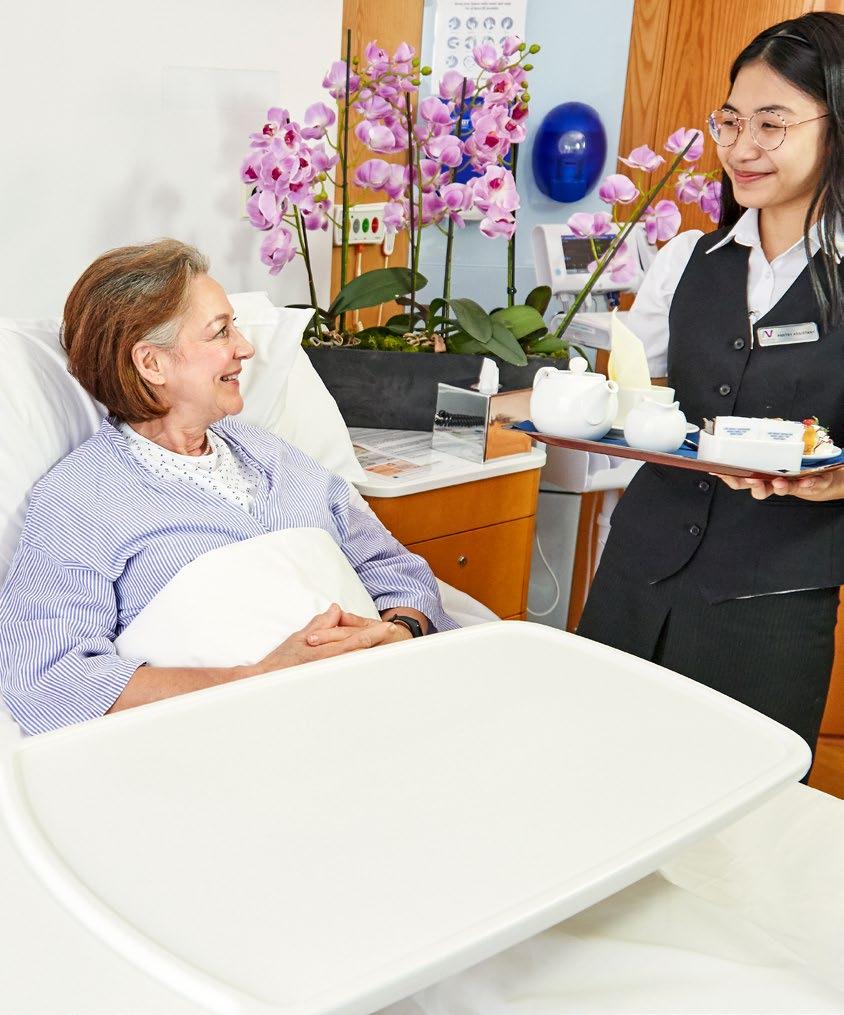

Patient Admission Guide
Welcome
On behalf of everyone at New Victoria Hospital, I would like to welcome you and to thank you for choosing us for your healthcare needs.
Your wellness and safety is our priority, and our staff are committed to providing you, and your family, with the highest possible standard of care with compassion, dignity and understanding. Our goal is to ensure a great healthcare experience for you and your loved ones.
We are a charity owned Hospital, and have been providing excellent, patient focused care for over 125 years. Our size allows us the opportunity to be responsive and innovative, and to provide very personalised care following a team approach. Whilst we have state-of-the-art facilities and technology, it is the dedication and experience of our staff and consultants that is the secret to our success.
The prospect of coming into hospital can be daunting for many patients. At New Victoria Hospital, you can depend on all of our staff to make the experience as comfortable and as free from stress as possible.
We believe that it will be of great help to you, to have all the essential information about the preparations for your surgery or treatment before you come into hospital. We hope the information which follows, will help you to approach your stay at New Victoria Hospital in a calm and positive frame of mind.

David Marshall Chief Executive
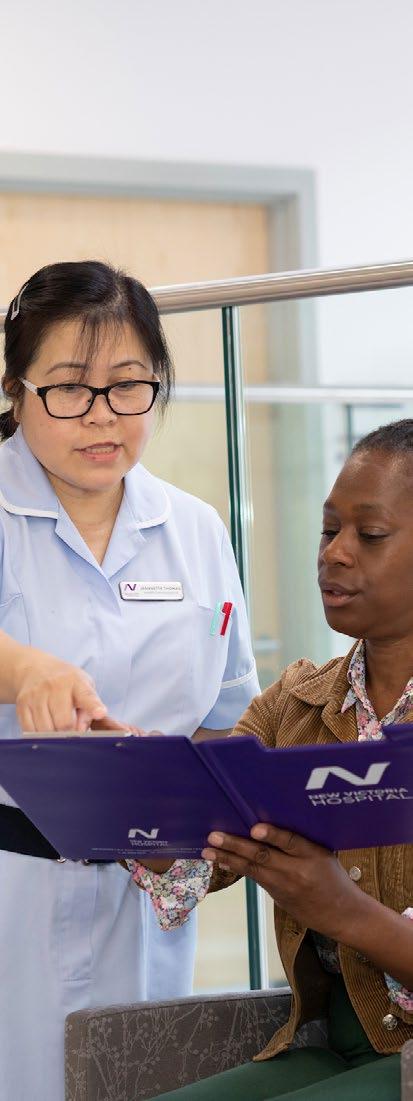
Introduction to New Victoria Hospital
New Victoria Hospital is a private, charity owned hospital based in Kingston upon Thames, Surrey and is one of the few remaining independent hospitals in the country.
It has provided a high level of service to the local community for over 125 years and is consistently ranked by patients as one of the top private hospitals in London.
Excellent standards of patient care, the expertise and compassion of our staff, together with our constant investment in the latest and best equipment enable us to have an uncompromising commitment to our patients’ safety and comfort.
The Hospital offers excellent speed of access and has a broad range of highly skilled Consultants providing a wide range of multi-speciality surgical and medical care.
Please note that New Victoria Hospital does not have Accident & Emergency (A&E), Intensive Care Unit (ICU) or High-Dependency Unit (HDU) facilities.
Facilities include:
• 19 Bedrooms with en-suites
• 14 Bed Day Surgery Unit
• 3 Operating Theatres
• 1 Endoscopy Theatre
• 15 Consulting Rooms
• 6 Treatment Rooms & Diagnostic Rooms
• Audiology Room
• Phlebotomy Room
• Cardiac Diagnostic Facility
• Imaging
• Physiotherapy
• Pathology
• Pharmacy
• Private GP Service
• Pre-operative Assessment rooms
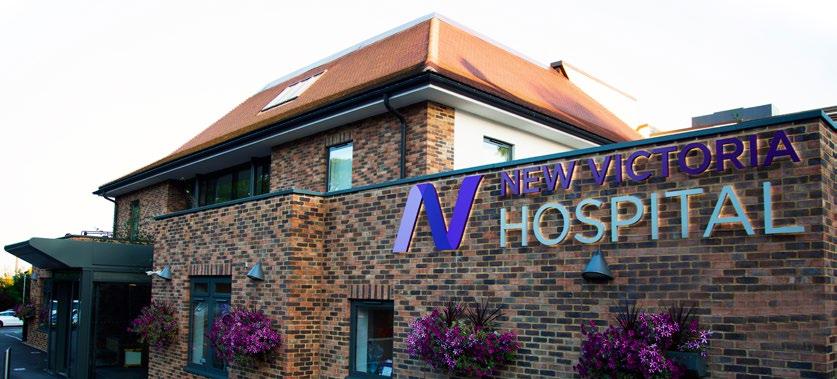
Before admission
Registration form
You will be asked to confirm your details on admission including authorisation number, if you are using private medical insurance, and next of kin details.
Pre-Operative Assessmement
All patients are asked to complete either a Lifebox digital Questionnaire or a New Victoria Hospital Pre-Operative Assessment and return it at their earliest convenience. These assessments ensure that all preoperative tests are completed before admission, allowing for a smooth admission on the day.
A pre-operative assessment and any required MRSA screening is undertaken within the Outpatient Department by a fully qualified registered nurse.
All patients are asked to complete a Lifebox digital questionnaire. In exceptional circumstances a print copy of the PreOperative Assessment form can be mailed to patients and has to be returned prior to their operation. The preoperative assessment ensures that we have your up to date medical and health information, any tests that are required prior to your procedure, are completed, and it provides any opportunity for any concerns that you have to be discussed. If you have any medical concerns relating to your admission, please contact your Consultant’s secretary.
Medication
Please continue to take your medication as prescribed, unless you have been advised otherwise. Some drugs may have to be stopped prior to surgery; please discuss this with your Consultant. New Victoria Hospital is responsible for the safe storage of drugs during your stay. It is of vital importance that you bring in a list of all the medication you take along with any drugs that you will need to take during your stay - including oral contraceptives, HRT, vitamins and natural supplements in their original packaging. This ensures that medicines given to you while you are in hospital do not interact with your own medicines and, therefore, compromise your procedure or safety.
Fasting
Staying well hydrated before surgery is beneficial to your recovery and we advise you drink plenty of water until your given fasting times; you will be advised of this in your admission letter. Do not drink alcohol or smoke for 24 hours before admission.
Disabled access
The Hospital entrances and exits have been designed to enable easy access for wheelchairs. If you require the use of a wheelchair during your stay, either for yourself or visitors, please let the receptionist know either beforehand or on arrival.
Special needs
If you have hearing difficulties, are partially sighted or have any other special requirements, please contact New Victoria Hospital’s Admissions Team on 020 8949 9010, so that we can make necessary arrangements prior to your admission.
If you are likely to need an interpreter to help you with your admission, please arrange to have one with you when you arrive at the Hospital. For the purpose of consenting, an independent, impartial interpreter must be used rather than a family member or close friend.
It is unsafe to travel by public transport after an anaesthetic or sedation, even if you are feeling well.
Chaperones
In order to respect your dignity, you will be offered a chaperone whilst having any treatments of an intimate nature, during your stay in hospital.
Arrangements for going home
If you have had a general anaesthetic or sedation you will need to make arrangements for someone to take you home. Please see Your Discharge – page 18.
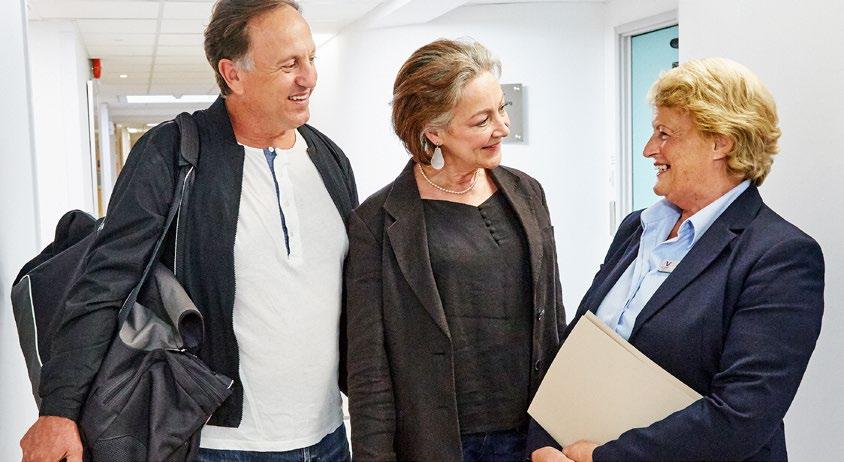
Exceptional service throughout your stay
What to bring
Valuables
Please avoid bringing any valuables or cash as New Victoria Hospital cannot accept responsibility for damage and loss. There is however a lockable drawer in your room or Day Unit bay, for your use.
Smoking and candles
New Victoria Hospital operates a non-smoking policy (including e-cigarettes), within the Hospital and its grounds. Additionally, due to the fact that there may be oxygen in use, we ask you to refrain from lighting candles.
Mobile phones and electrical equipment
You may use your mobile phone in your room, but in order to respect the needs of other patients we ask that they are set to silent.
However, please observe any signs that you may see around the Hospital asking you to switch off your mobile phones.
If you wish to bring personal electrical equipment with you please ensure that all items are in good working order and the electrical chargers being used have a manufacturer’s brand or logo, model and batch number, and CE mark.
What to bring with you
All patients
• Please ensure that you bring all relevant x-rays and scans
• If possible, you should wear glasses instead of contact lenses, which would need to be taken out before surgery
• Please bring all medication with you in pharmacy labelled bottles or blister packs
Overnight patients
• Pyjamas / nightdress
• Toiletries
Please do not wear any make up or jewellery (other than a wedding band).
Your anaesthetic
Your procedure may require you to have an anaesthetic. If this is the case you will have been notified in your admission letter. For patients being admitted for a hip or knee replacement, you will have been sent a separate anaesthetic leaflet – ‘Anaesthetic Choices for Hip or Knee Replacement’ which takes the place of the information that follows.
Some types of anaesthesia
Anaesthesia stops you feeling pain and other sensations. It can be given in various ways and does not always make you unconscious.
Local anaesthesia involves injections which numb a small part of your body. You stay conscious but free from pain.
Regional anaesthesia involves injections which numb larger or deeper parts of the body. You stay conscious but free from pain.
General anaesthesia gives a state of controlled unconsciousness. It is essential for some operations. You are unconscious and feel nothing.
Anaesthetists
Anaesthetists are doctors with specialist training who:
• discuss types of anaesthesia with you and find out what you would like, helping you to make choices
• discuss the risks of anaesthesia with you
• agree a plan with you for your anaesthetic and pain control
• are responsible for giving your anaesthetic and for your wellbeing and safety throughout your surgery
• make your experience as pleasant and pain free as possible
Your Anaesthetist will meet you before your operation and will
• ask you about your health
• discuss with you which types of anaesthetic can be used
• discuss with you the benefits, risks and your preferences
• decide with you which anaesthetic would be best for you
• make the decision for you if you prefer
Nothing will happen to you until you understand and agree with what has been planned for you. You have the right to refuse if you do not want the treatment suggested.
Before your anaesthetic
You will be asked some questions to check your health before the operation.
This may be at a pre-operative assessment clinic, by filling in a questionnaire, by talking to your doctors on the ward, or when you meet your anaesthetist.
On the day of your operation
• The Hospital will have given you clear instructions about fasting in your admission letter. It is important to follow these. If there is food or liquid in your stomach during your anaesthetic, it could come up to the back of your throat and damage your lungs
• If you are a smoker, do not smoke for 24 hours before your admission. This will help avoid breathing problems during your anaesthetic
• If you are taking medicines, you should continue to take them as usual, unless your anaesthetist or surgeon have asked you not to
• If you feel unwell prior to admission, please telephone the Hospital for advice
Questions you may like to ask your anaesthetist
• Who will give my anaesthetic?
• Do I have to have a general anaesthetic?
• What type of anaesthetic do you recommend?
• Have you often used this type of anaesthetic?
• Do I have any special risks?
• How will I feel afterwards?
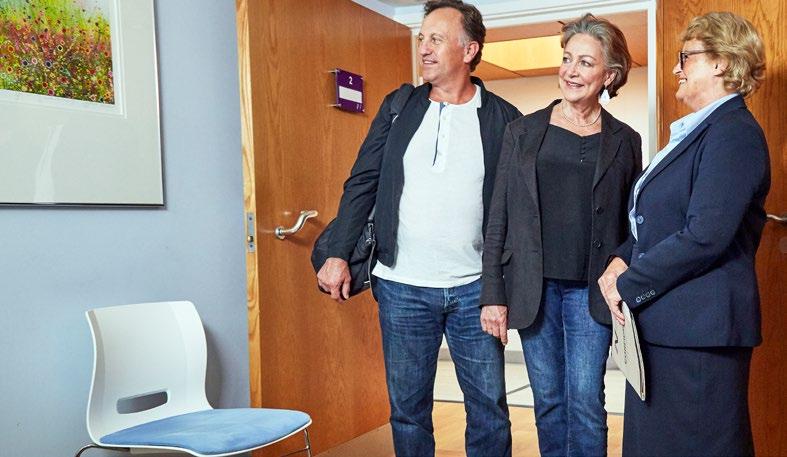
Your consultant will visit you every day during your stay.
The choice of anaesthetic depends on
• your operation
• your answers to the questions that have been asked
• your physical condition
• your preferences and your reasons for them
• your anaesthetist’s recommendations for you and the reasons for them
Premedication (a premed) is the name for drugs which are sometimes given before an anaesthetic. Some premeds prepare your body for the anaesthetic, others help you to relax. They may make you more drowsy after the operation and this could delay your discharge. If you want to go home on the same day, this may be delayed. If you think a premed would help you, ask your anaesthetist.
General anaesthetics
There are two ways of starting a general anaesthetic:
• Anaesthetic drugs may be injected into a vein through the cannula (this is generally used for adults)
• You can breathe anaesthetic gases and oxygen through a mask, which you may hold if you prefer
Once you are unconscious, an anaesthetist stays with you at all times and continues to give you drugs to keep you anaesthetised.
As soon as the operation is finished, the drugs will be stopped or reversed so that you regain consciousness.
After the operation, you may be taken to the recovery room. Recovery staff will be with you at all times. When they are satisfied that you have recovered safely from your anaesthetic you will be taken back to the ward.
A needle may be used to start your anaesthetic. If this worries you, you can ask to have a local anaesthetic cream put on your arm to numb the skin before you leave the ward. The ward nurses should be able to do this.
If you are having a local or regional anaesthetic, you will also need to decide whether you would prefer to:
• be fully alert
• be relaxed and sleepy (sedation)
• have a general anaesthetic as well
Sedation is the use of small amounts of anaesthetic or similar drugs to produce a sleep-like state.
You can wear your glasses, hearing aids and dentures until you are in the anaesthetic room.
When you are called for your operation
• A member of staff will go with you to the theatre department
• You can wear your glasses, hearing aids and dentures until you are in the anaesthetic room. If you are having a local or regional anaesthetic, you may keep them on
• Jewellery and decorative piercing should ideally be removed. If you cannot remove your jewellery, it can be covered with tape to prevent damage to it or your skin
• If you are having a local or regional anaesthetic, you may be able to take your own electronic device with you to listen to music through your headphones
• Most people walk to theatre and you will be provided with dressing gown and slippers
• Theatre staff will check your identification bracelet, your name and date of birth, and will ask you about other details in your medical records as a final check that you are having the right operation
The operating theatre
Your anaesthetic may start in the anaesthetic room or in the operating theatre. The anaesthetist will monitor you, checking your body functions, heart rate etc.
For many anaesthetics, including some types of local anaesthetic, a needle is used to put a cannula (thin plastic tube) into a vein on the back of your hand or arm.
When the anaesthetic has started, you will go through to the operating theatre for the operation.
Local and regional anaesthetics
• Your anaesthetist will ask you to keep quite still while the injections are given
• You may notice a warm tingling feeling as the anaesthetic begins to take effect
• Your operation will only go ahead when you and your anaesthetist are sure that the area is numb
• If you are not having sedation you will remain alert and aware of your surroundings. A screen shields the operating site, so you will not see the operation unless you want to
• Your anaesthetist is always near to you and you can speak to them whenever you want to
Pain relief afterwards
Good pain relief is important and some people need more pain relief than others. It is much easier to relieve pain if it is dealt with before it gets bad. Pain relief can be increased, given more often, or given in different combinations.
Occasionally, pain is a warning sign that all is not well, so you should ask for help when you feel pain.
Recovery staff will be with you at all times. When they are satisfied that you have recovered safely from your anaesthetic you will be taken back to the ward.
Here are some ways of giving pain relief:
• Tablets or liquids to swallow. These are used for all types of pain. They take at least half an hour to work. You need to be able to eat, drink and not feel sick for these drugs to work
• Injections. These are often needed, and may be intravenous through your cannula into a vein for immediate effect, or into your leg or buttock muscle. If in a muscle they may take up to 20 minutes to work
• Suppositories. These waxy pellets are put in the back passage (rectum). The pellets dissolve and the drug passes into the body. They are useful if you cannot swallow or if you might vomit
• Patient-controlled analgesia (PCA). This is a pump that delivers pain relief drugs via a syringe and tubing into a vein in your arm, and which allows you to control your own pain relief. If you would like more information ask for a leaflet on PCA
• Local anaesthetics and regional blocks These types of anaesthesia can be very useful for relieving pain after surgery. More details can be found in the leaflet, ‘Epidural For Pain Relief After Surgery’ at www.rcoa.ac.uk.
What will I feel afterwards?
How you feel will depend on the type of anaesthetic and operation you have had, how much pain relieving medicine you need and your general health.
Understanding risk
In modern anaesthesia, serious problems are uncommon. Risk cannot be removed completely, but modern equipment, training and drugs have made it a much safer procedure in recent years.
To understand a risk, you must know:
• how likely it is to happen
• how serious it could be
• how it can be treated
The risk to you as an individual will depend on:
• whether you have any other illness
• personal factors, such as smoking or being overweight
• surgery which is complicated, long or done in an emergency
Side-effects and complications
More information on the side-effects and complications are available at:
Patient Info – Royal College of Anaesthetists
Risk at a glance
If you wish to find out more information there are other leaflets available at www.rcoa.ac.uk
Coming in to hospital
On your arrival
Please arrive at New Victoria Hospital at the requested time.
After your arrival, you will be escorted to your room or Day Unit bay by a member of staff who will familiarise you with your surroundings, explaining how to operate the nurse call system, lighting and television.
Soon after your arrival a nurse will come to ask you a series of questions in order to obtain a concise medical and social history. You will be asked to hand over your medication for safe storage. Your weight and height will be measured; this is to aid the anaesthetist when calculating the necessary dose of medication. The nurse will also record your blood pressure, heart rate, oxygen saturation level and temperature; this acts as a baseline measurement prior to surgery.
You may find that you are asked the same questions by different people as part of our checking procedure. This is standard practice and ensures maximum safety for every patient receiving care in hospital. For this reason you will be required to wear a patient identification wristband throughout your stay in hospital.
Your room
All our patient bedrooms are equipped with: television including Sky News and Sky Sports; radio; WiFi; ensuite bathroom with walk-in shower; air conditioning and temperature control; telephone; secure facilities for valuables. Patient bays in the Day Surgery unit are equipped with: WiFi; iPads on request; air conditioning and temperature control; valuables storage.
During your stay
Prior to surgery you will be seen by your consultant and asked to sign a consent form. He/she will outline what will happen during the operation. You will also be seen by your anaesthetist.
Patient guides for most procedures can be found on our website. These high-quality endorsed patient information leaflets are produced by EIDO Healthcare and provide an overview of the benefits of surgery, what the operation involves and any potential risks or complications. We strongly advise that you take the time to read this information.
You will be given an approximate time when you are expected to go to theatre, although this can change. We appreciate that waiting to go to theatre can be a very anxious time. The nursing staff on the ward will keep you informed of any delays as soon as they are made aware of them.
You will be required to wear a hospital gown, and disposable pants will be provided. For specific procedures you may be required to remove any make-up, nail varnish, contact lenses, dentures and jewellery. Wedding bands can usually be retained and will be taped over.
You may also be asked to wear surgical stockings; these help to prevent blood clots forming in the legs. Your consultant and anaesthetist may also want you to have anticlotting injections for the first few days after the operation, depending on your procedure.
When it is time for your operation, you will be accompanied by a healthcare professional to the anaesthetic room, where the theatre staff will take over your care.
After your surgery or treatment, you will be taken to the recovery unit where you will begin to wake up. The amount of time spent in the recovery unit varies by individual, the nature of the surgery and the way you react to your anaesthetic.
When you wake up, you may have an oxygen mask over your face; this is quite normal. A nurse will be checking your pulse, blood pressure and breathing rate, whilst ensuring that you are comfortable and in as little pain as possible. When you are fully awake, you will be taken back to your room or Day Unit bay, escorted by a nurse who will monitor you as you continue to recover.
If you experience any pain, let your nurse know immediately so appropriate pain relief can be arranged.
The type of operation or treatment that you have had will determine when you can start drinking and eating again. Your nurse will advise you. If you have undergone surgery you will need the assistance of a nurse when attempting to get out of bed for the first time even if you feel perfectly capable.
Infection control
New Victoria Hospital has an extremely low infection rate and there have been no incidences of hospital acquired MRSA or Clostridium Difficile.
Our Infection Prevention and Control Lead works closely with the clinical and nonclinical staff and has the support of a 24-hour on call Consultant Microbiologist.
Our dedicated housekeepers receive regular training in infection control procedures to maintain high standards of cleaning and ensure a dust free environment.
We ask our patients for their active cooperation in maintaining our standards. You can help by remembering that frequent hand-washing is the most important way of preventing infection, so always remember to wash your hands:
• before and after meals
• after using the toilet or commode
Staff attending you will wash or gel their hands prior to any care intervention and hand gel is readily available in your room for staff, patient and visitor use.
If you have an intravenous infusion, wound drain or catheter do not touch these, or any other device.
Speak to your nurse if:
• your infusion line, urinary catheter or wound drain becomes loose or disconnected
• your dressing becomes loose or you see any leakage from the wound or infusion site
• you have any pain or redness at the site of your infusion
We recommend that friends or relatives with a cold, chest infection, diarrhoea and vomiting or any other infection, do not visit you while you are in hospital. Your visitors will be reminded to use the alcohol hand gel on their arrival.

Visiting times are between 10am and 9pm.
Visitors
Visiting times are between 10am and 9pm; although we advise you to try and limit the number of visitors you have immediately after your operation. Visitors are not allowed in the Day Unit. Family members and friends are welcome to wait in the main reception areas. In exceptional circumstances, one visitor can be allowed in the Day Unit.
We also recommend that very young children – especially those who have not been immunised – wait until you leave hospital and are feeling better, before they visit you. If you wish your visitors to eat with you in your room or bay, this can be arranged for an additional charge. If you do not wish to receive visitors or telephone calls, please speak with your nurse.
In exceptional circumstances, you may wish to have someone stay with you overnight. This may be possible if:
1. You have been assessed as critically ill 2. The relative/friend is acting as a carer/ interpreter/chaperone
3. You are under 18 years of age
Spiritual and religious needs
You will be asked by your nurse if you have any specific spiritual or religious requirements during your stay with us. We will endeavour to meet these needs in as sensitive a way as possible. If you wish to have support from a spiritual or religious representative of your faith, the ward staff have the contact details of local places of worship and will assist you as necessary.
Our catering service
Our dedicated chefs and catering team are committed to providing you with a first class service and meeting your individual nutritional and dietary requirements. A wide variety of freshly cooked hot meals, prepared on site each day, are on offer.
When the full menu is not suitable for you in the post-operative stage or at certain other times during your stay related to your medical condition, an alternative light menu will be offered, as appropriate. Your nurse will advise you on the suitability of certain food choices to reflect any medically necessary constraints.
We understand the importance of meeting dietary needs and our menus have been nutritionally assessed by a dietitian.
The timings of our dining service have been developed in response to patient feedback, however, flexibility is shown whenever requested. Morning and afternoon tea and coffee are served each day, however, hot and
cold drinks and snack foods are available at any time on request.
Menus are distributed ahead of mealtimes to allow you enough time to consider the choices available to you. If you require clarification on any element of the catering service please do not hesitate to speak to one of the catering team or your nurse.
Please let us know if you have any special dietary requirements or food allergies at the earliest opportunity. Some food items may contain nuts or derivatives of nut products and other allergens. The hospital holds a folder which highlights all the allergens from our daily menus.
Our staff are able to advise on the content of each food item as required.
Where the menu choices do not meet your dietary needs or personal preferences our chefs are very happy to discuss this with you and will prepare a dish of your choice wherever possible.
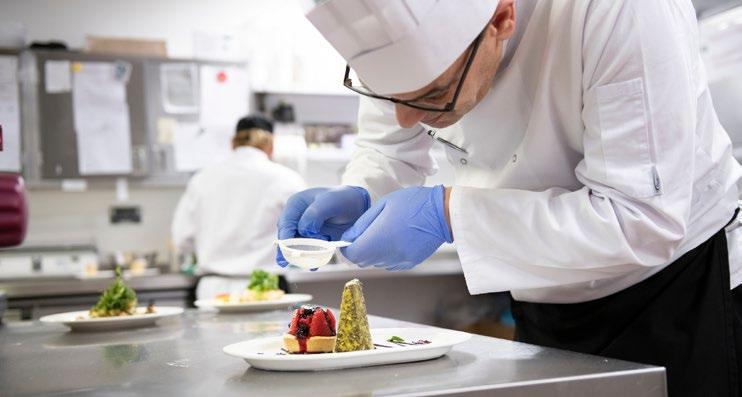
Your discharge
We expect all day surgery patients to be discharged on the day of admission. Patients who stay for one night or more are usually discharged by 10am.
Your nurse will let you know when you can go home and give you any advice and information you may need, including any relevant contact numbers. When appropriate, you will be advised how to care for your wound when you are discharged, and how soon you will be able to have a bath or shower.
Your consultant may wish to see you before discharge. If they have prescribed medication for you, this will be given to you with advice from a member of the pharmacy team before you leave. Your consultant will let you know if you require a follow-up appointment. If you do, you will be assisted in making this appointment, prior to your discharge.
If you have had a general anaesthetic, or any other sedation, you MUST NOT DRIVE FOR THE NEXT 24 - 48 HOURS.
Driving after sedation is similar to driving whilst drunk and the authorities would view it in the same way. You should also avoid drinking alcohol, operating machinery, cooking, making any important decisions or signing contracts for 24 hours after your treatment. You should ensure that there will be someone at home to look after you, at least for the first 24 hours.
You should make arrangements for someone to collect you by car after your treatment, or ask them to accompany you in a taxi. It is unsafe to travel by public transport after an anaesthetic or sedation, even if you are feeling well.
When leaving New Victoria Hospital, please remember to take all your belongings, including your own medication and takehome drugs. If you require assistance with your luggage to your waiting transport, please ask a member of staff on the ward to arrange this for you.
After you leave
If you have any concerns following your operation or procedure, please contact New Victoria Hospital on 020 8949 9000 and ask for the Nurse in Charge.
Settling your account
The Hospital endeavours to provide as much information and reassurance about the cost of treatment by pre-handling as many of the financial and administration arrangements as possible before your proposed treatment or admission date.
Financial agreement
The registration form contains a financial agreement which we ask you to sign. By signing it, you recognise and accept your responsibility for settling our fees if they are not covered by a health insurance policy or other third party. (If the patient is under 18 years of age, the agreement should be signed by the patient’s parent, guardian, or legal representative).
If your treatment is not covered by your insurance policy, or not met in full, you are responsible for the outstanding amount.
Self Pay patients are required to pay in full for their treatment prior to admission. Failure to do so may result in the postponement or cancellation of admission.
Insured Patients
If you have medical insurance you need to contact your insurer prior to the commencement of any treatment, to obtain a pre-authorisation number. Your treatment may not be covered in full by them or your claim delayed if you fail to do this.
Our registration form asks you to provide us with details of your medical insurance including your membership and preauthorisation numbers.
Charges not covered by insurance
Services such as telephone calls and meals for visitors are not covered by health insurance. The sale of items like walking sticks and crutches, will not be covered by your insurance policy. These will be charged at commercial rates.
Consultants’ fees
The consultant who treats you, provides their services to you independently of the Hospital. If you are insured, your consultant will send their bills directly to your insurer who will settle them in accordance with your policy.
Settling your claim
Your insurer will advise you if your claim has been rejected or only paid in part, in which case you are responsible for the prompt settlement of the outstanding balance. You will be invoiced separately for any services not covered by your insurance after you leave the Hospital.
If you are covered by a medical insurer who is based overseas we ask you to notify us as soon as possible. In such cases you will usually need to settle the account yourself and be reimbursed by your insurer afterwards. There may be occasions when we ask for an imprint of your credit card on admission.
For payment methods please see page 20.
To see the full Terms and Conditions visit www.newvictoria.co.uk
Self Pay Patients & Fixed Price Surgery
FixedPriceSurgeryofferspatientsanallinclusivepriceforawiderangeofoperations andtreatments.Detailsofwhatisorisnot includedinyourSelfPaysurgerycanbeseen onpages21and23.
Payment
YouarerequiredtopayinadvanceforFixed PriceSurgery.
Weaskthatpatientspayinfullatleast 10 workingdayspriortotheiradmission.
Ifabookingismadelessthan5daysbefore admissionthenpaymentwillberequired immediately.
Wereservetherighttoamendourpricesor torefuseyoutreatmentatourfixedpricesif wehaveconcernsthatyourgeneralmedical conditionsmightresultincomplications.
TheRegistrationFormcontainsafinancial agreementwhichweaskyoutosign.By signingityourecogniseandacceptyour responsibilityforsettlingyouraccount. Ifthepatientisunder18yearsofage,the agreementshouldbesignedbythepatient’s parent,guardian,orlegalrepresentative.
Ifyoudonotpayinfullforyourtreatment priortoyouradmissionwereservetheright tocancelorpostponeyouradmission.
Payment methods
Payment can be made in one of the following ways:
By credit/debit card
We accept VISA or Mastercard. You can pay either in person at our Reception Desk or by telephoning Patient Accounts on 020 8949 9641/9646
By internet bank transfer
Our bank account details are:
Account Name: New Victoria Hospital Ltd
Sort Code: 40 26 12
Account Number: 01688561
In order for us to identify your payment please use your invoice or account number as a reference.
By cash
In person at our Reception.
By cheque
By post for the attention of the Patient Accounts Team at the Hospital, or in person at our Reception. Cheques should be sent at least 10 working days prior to admission to allow for clearance.
What is included in your fixed price treatment package
The treatment letter you receive will confirm the fixed price for the care that you are to receive under your treatment package. Unless stated otherwise, the fixed price in relation to your treatment package includes:
Prior to your admission
• a clinical pre-operative assessment which includes all screening tests to assess your suitability for treatment;
During your stay in hospital
• New Victoria Hospital’s fee, the Consultant’s procedure fee and the Anaesthetist’s fee (where applicable);
• your accommodation in New Victoria Hospital including your meals and nonalcoholic beverages. The Hospital will make no additional charge if, due to a recognised complication of your surgery, you need to stay for longer than originally expected;
• all nursing care, physiotherapy, imaging and operating theatre charges;
• all drugs and medical consumables used during your stay;
• all pathology tests;
• a standard range of prostheses for your procedure, where applicable; and
• any additional costs arising from medical complications related to the your procedure during your hospital stay;
Aftercare
following your discharge
• the provision of any standard mobility aids that you may require such as walking sticks and crutches;
• outpatient care relating to your procedure will be available to you at New Victoria Hospital for up to sixty days, and includes, where applicable:
(i) clinically necessary physiotherapy to support your rehabilitation. The number of treatment sessions/time frame offered will depend on the surgical procedure (*Pain management and hand surgery not included);
(ii) the removal of sutures, stitches and dressings;
(iii) one post-operative scan (for orthopaedic procedures only).
• all take home medication you require on the advice of, or as prescribed by your Consultant, for a period of up to seven days.
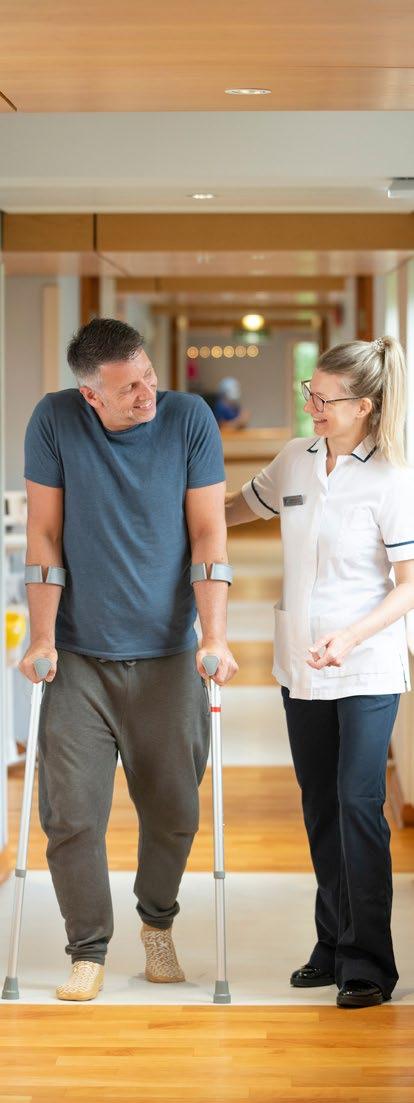
What is not included in your fixed price treatment package
Unless stated otherwise, the fixed price in relation to your treatment package excludes:
• any initial outpatient diagnostic services at New Victoria Hospital which are carried out prior to the clinical pre-assessment;
• fees for all outpatient consultations before and after surgery which will be invoiced to you directly by your Consultant unless otherwise specified;
• large home aids such as commodes, wheelchairs or stair lifts;
• boots and knee braces following lower limb surgery;
• post-discharge specialist nursing or care that may be required (whether provided at home or otherwise);
• any post-discharge, outpatient treatment or care carried out at another hospital that is not part of New Victoria Hospital;
• any bespoke prostheses and similar devices outside of the standard range offered by New Victoria Hospital;
• any replacement prostheses, where required due to normal wear and tear;
• accommodation for an adult accompanying a dependent;
• ambulances and other transport to and from the Hospital;
• treatment of other conditions identified at the clinical preoperative assessment and which require a separate pathway of care;
• your accommodation if you choose to remain an inpatient at the Hospital after your Consultant has advised there is no clinical reason for you to stay. In this instance the Hospital will make an additional charge for each night that you remain in Hospital;
• any revision procedure which is not clinically required;
• any sundry items e.g. visitors’ food and drinks; and
• anything else not covered in “What is included in your fixed price surgery” (p21) or anything listed in your treatment letter as being excluded from your treatment package.
To see the full Terms and Conditions visit newvictoria.co.uk
Additional information
Statement of purpose
Under the Health and Social Care Act 2008, (Regulated Activities) Regulations 2014 and the Care Quality Commission (Registration) Regulations 2009, Regulation 12, it is a requirement that all health and social care providers produce a Statement of Purpose, in relation to the Hospital’s regulated activities.
The Statement of Purpose has been submitted to the Care Quality Commission and is available for inspection by every patient and any person acting on behalf of a patient.
If you wish to see the Statement of Purpose, it can be viewed on the Hospital website.
Outcomes of care
The Hospital is committed to the delivery of safe care and as such monitors all activity throughout the organisation. Processes are in place to minimise all identified risks and are regularly reviewed against any incident, accident or adverse event.
New Victoria Hospital takes very seriously any incident that occurs during a patient’s stay. The Hospital operates a policy of being open and honest when things go wrong; known as Duty of Candour. This means that we will apologise to you, carry out a full investigation and keep you informed of any lessons learned and what we have done to prevent a similar incident from reoccurring. For further details, please request a copy of our Duty of Candour leaflet.
Information on key performance indicators, as defined and monitored by the Care Quality Commission, is available on request. The data collated includes infection rates and set adverse outcome criteria.
If you would like further information relating to key performance indicators, please use the Hospital contact details at the back of this leaflet.
The right to a second opinion
You are entitled to request a second opinion regarding the treatment offered by your consultant. This can be arranged on request by your admitting consultant or GP. The fee for a second opinion would be your responsibility.
Care Quality Commission
The Hospital is registered with and regulated by the Care Quality Commission. Should you wish to contact the CQC there is an online contact form on their website. Alternatively their telephone number is 03000 616161
E-mail: enquiries@cqc.org.uk
If you wish to view a copy of the latest CQC Inspection report for New Victoria Hospital, this can be obtained from the CQC using the contact details above or it can be viewed via the link on the Hospital website
The Hospital is committed to the delivery of safe care and as such monitors all activity throughout the organisation.
Patient feedback
Feedback on the service we deliver is vitally important to ensure it reflects what is expected and required by our patients, and the Hospital will seek your views about the care and services you have received whilst in the Hospital. You will be provided with a patient questionnaire on discharge and it would be appreciated if you could complete this or the on-line form at your earliest convenience. If you would like a response to your feedback please ensure you record your name and contact details on the form.
Feedback is collated monthly and is available to view on the Hospital’s website or on request. If you wish to make any other comments about the services provided or the content of this guide, we would be very happy to hear from you. Any suggestions for service improvements are reviewed and fully considered. This can be done either via email to enquiries@newvictoria.co.uk or in writing to the Director of Clinical Services, using the Hospital contact details at the back of this leaflet.
Patient complaints
The Hospital prides itself on providing patients with the best available treatment and care. However, if we failed to meet your expectations and you are not satisfied with the service you or a close relative has received, it is your right to have your concerns investigated and be given a full and prompt reply. Our booklet ‘Making a complaint - a guide for patients’ is available in your room, at each reception area and on the Hospital website and explains the process to follow. A member of the staff will assist you with this, as required.
Patient Advisory Liaison Service (PALS)
This service applies to NHS patients receiving treatment at this Hospital. Any issues related to care received at New Victoria Hospital, are investigated and managed via the Hospital’s complaints procedure. The Hospital is obliged to inform the appropriate NHS Trust of the issues and provide the patient with the contact number for the relevant PALS.
Accessing this service will not compromise your care at this Hospital.
Support groups
The Hospital is able to facilitate access to various support groups e.g. Macmillan Cancer Support or Breast Cancer Care. Your nurse will assist you with this, as required.
Access to medical records
Patients are entitled to a copy of their medical records. In accordance with the Data Protection Act 1998, a formal written application is required and a discretionary fee may be charged for the administration of the request.
Useful contacts
Reception/Switchboard:
Tel: 020 8949 9000 Email: reception@newvictoria.co.uk
Self Pay:
Tel: 020 8949 9090 Email: selfpay@newvictoria.co.uk
Outpatients:
Tel: 020 8949 9020 Email: outpatients@newvictoria.co.uk
Admissions:
Tel: 020 8949 9010 Email: admissions@newvictoria.co.uk
Pre-operative Assessment:
Tel: 020 8949 9437/9049 Email: preop-assessment@newvictoria.co.uk
Patient Accounts:
Tel: 020 8949 9641/9646 Email: patientbilling@newvictoria.co.uk
Imaging:
Tel: 020 8949 9030 Email: imaging@newvictoria.co.uk
Physiotherapy:
Tel: 020 8949 9040 Email: physiotherapy@newvictoria.co.uk
Pathology:
Tel: 020 8949 9083 Email: pathology@newvictoria.co.uk
Pharmacy:
Tel: 020 8949 9076 Email: pharmacy@newvictoria.co.uk
Private GP Service:
Tel: 020 8949 9640 Email: privategp@newvictoria.co.uk
How To Find Us
By Road: From the M25, exit junction 10 and take the A3 towards London. Continue along A3 for approximately 13 miles, past the Hook, Tolworth, New Malden and Raynes Park interchanges. At the next interchange, take A238 towards Kingston upon Thames and New Victoria Hospital is on the left hand side, 100 metres from the top of the slip road.
By Rail: Raynes Park and Kingston railway stations are approximately 5 minutes by taxi. Wimbledon Underground and railway station is approximately 10 minutes by taxi.
By Bus: The number 57 route from Kingston, Raynes Park and Wimbledon train stations provides a regular service.
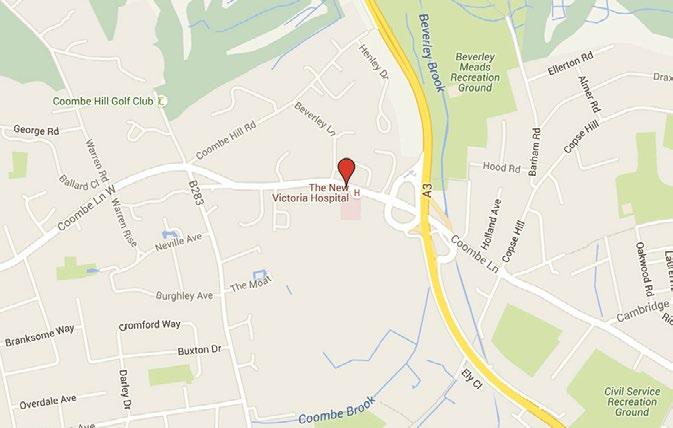
London
M25
Wimbledon
Kingston
184 Coombe Lane West, Kingston upon Thames, Surrey KT2 7EG
Tel: 020 8949 9000
Email: enquiries@newvictoria.co.uk
Web: www.newvictoria.co.uk

Version - April 2025
